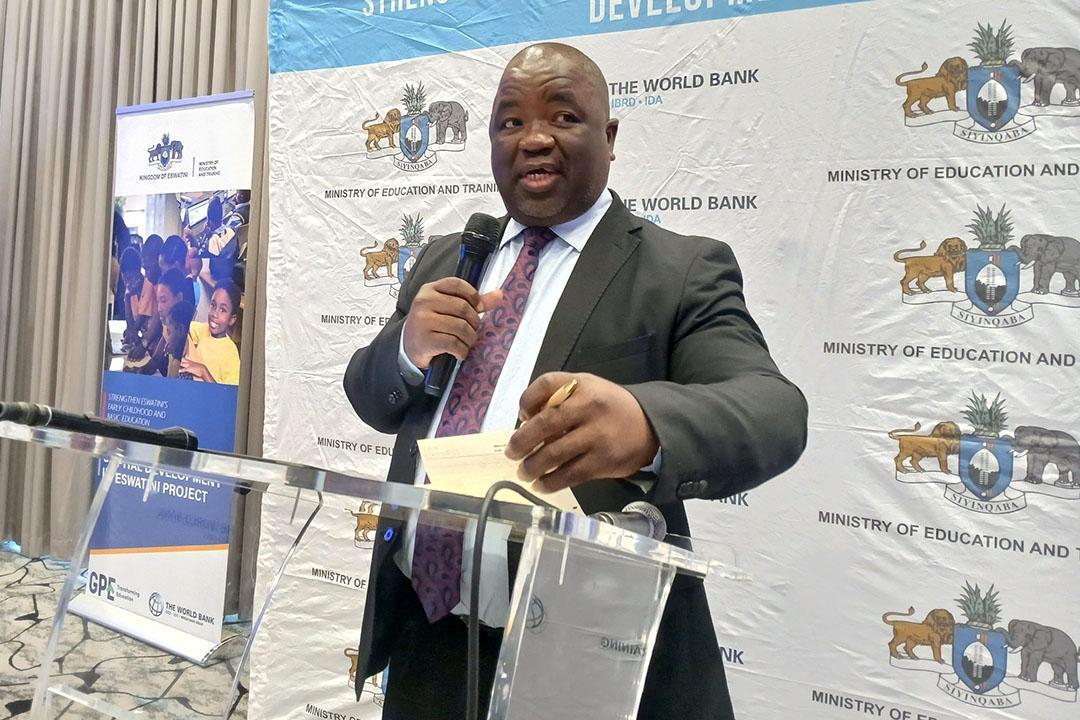Africa-Press – Eswatini. Eswatini has taken another historic stride towards building a brighter, knowledge-driven future for its young citizens. The Ministry of Education and Training, in collaboration with the World Bank and Global Partnership for Education (GPE), has embarked on a transformative project titled “Strengthening Early Childhood Development and Basic Education Systems,” aimed at nurturing human capital from the earliest years of learning.
The landmark initiative, valued at $32.1 million, comprising a $27.35 million World Bank loan and a $4.75 million GPE grant, is being implemented across all regions of the Kingdom. It seeks to bridge education gaps, uplift learning outcomes, and ensure that no child is left behind.
For the first time in Eswatini’s history, early childhood education is being fortified through large-scale, evidence-based interventions. A total of 340 Grade 0 classrooms have been equipped with indoor and outdoor learning materials, while teachers have received specialized training to strengthen instruction quality. New assessment tools now measure children’s cognitive, emotional, and motor development, ensuring they are school-ready. Additionally, the Read at Home initiative is supporting 750 children and 495 caregivers with SiSwati and English storybooks, encouraging literacy beyond the classroom.
“Education is our nation’s gateway to opportunity,” said a World Bank representative. “We commend Eswatini’s unwavering commitment to ensuring every child has access to quality early learning environments.”
At the primary level, the project is advancing the Competency-Based Curriculum (CBE) for Grades 1–3. Over 1 200 teachers have been trained to apply innovative, formative assessments aligned with the new curriculum. In a groundbreaking move, Eswatini conducted its first-ever national standardized learning assessment, a milestone that allows policymakers to make data-driven decisions to improve literacy and numeracy outcomes.
“We are strengthening the very foundation of our education system,” said Minister of Education and Training Owen Nxumalo, emphasizing the country’s determination to raise standards and learning equity.
The project’s impact extends to 126 junior secondary schools, where technology is revolutionizing the teaching of Mathematics and Science. The innovative Progressive Math Initiative/Progressive Science Initiative (PMI/PSI) has been introduced, providing ICT resources and training to 139 teachers and 2 084 learners across 20 pilot schools. Interactive touchscreens, tablets, routers, and digital learning materials are helping demystify Science and Mathematics, once perceived as difficult subjects, and inspiring more students, especially girls, to pursue STEM careers. Early evaluations show improved performance, enthusiasm, and confidence among learners.
Recognizing that every learner’s success contributes to national progress, the project includes targeted programs to keep children in school, particularly the most vulnerable. The Orphaned and Vulnerable Children (OVC) Grant Program is being redesigned to ensure equitable support and faster access to funds. Meanwhile, new Boys’ and Girls’ Clubs have been introduced in 62 schools, offering safe spaces, mentorship, and life skills that empower youth to overcome challenges such as poverty, gender-based violence, and substance abuse.
“Every child who drops out represents a loss of potential, for their family, community, and the nation,” Nxumalo stressed. “We must work together to keep the doors of opportunity open for every single learner.”
The Ministry has emphasized the vital role of the media in amplifying the project’s impact. Journalists are being sensitized to report accurately on the reforms, turning statistics into powerful stories that inspire action. “You are not just reporters, you are storytellers, advocates, and partners in shaping our country’s future,” the World Bank representative told members of the media. “Through your voices, Eswatini’s education journey becomes a story of hope and collective triumph.”
The “Strengthening Early Childhood Development and Basic Education Systems Project” reflects Eswatini’s firm commitment to achieving inclusive, quality education for all, in line with the Education Sector Strategic Plan (2022–2034) and the UN Sustainable Development Goals (SDG 4). By investing in the earliest years, strengthening foundational learning, and modernizing secondary education, Eswatini is shaping a future where every child can learn, dream, and succeed — the essence of a truly empowered nation.
Eswatini’s education transformation is not just a policy milestone, it is a living testament to the nation’s belief that education is the heartbeat of progress. With every classroom equipped, every teacher empowered, and every child supported, Eswatini is writing a story of promise, resilience, and shared prosperity.
For More News And Analysis About Eswatini Follow Africa-Press







